RELOOP BEATPAD
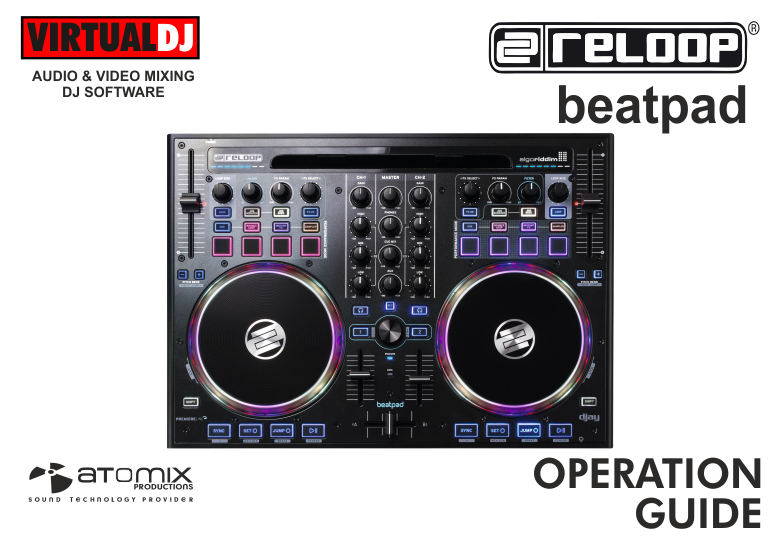
INSTALLATION
Firmware & Drivers
Firmware: Update the firmware of the unit to the latest version from http://www.reloop.com/reloop-beatpad
Drivers (for Windows only): Install the latest Reloop ASIO drivers from http://www.reloop.com/reloop-beatpad
No drivers are required for Mac OSX computers
VirtualDJ Setup
Once VirtualDJ 8 is launched, a Login Window will appear to enter your virtualdj.com account credentials.
A Pro Infinity, a Plus or a Pro Subscription License is required to fully use the Reloop Beatpad. Without any of the above Licenses, the controller will operate for 10 minutes each time you restart VirtualDJ.
http://www.virtualdj.com/buy/index.html

Select “Use Soundcard” in order VirtualDJ to use the pre-defined audio configuration for the unit. Speakers and Headphones need to be connected to the Beatpad in this case.
Click to OK.
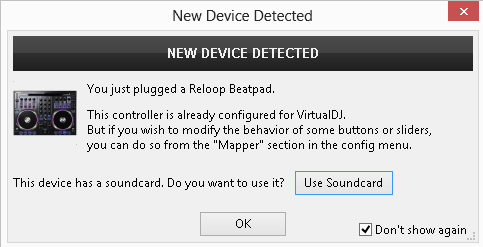
The unit is now ready to operate.
MIDI Operation
Find more details at http://www.virtualdj.com/wiki/VDJ8script.html
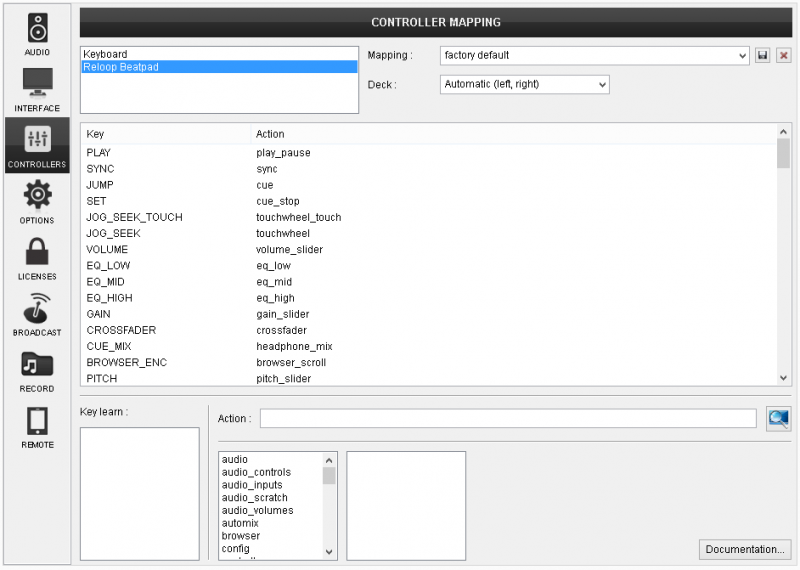
AUDIO Setup
Alternative Audio setups can be applied in the same window.
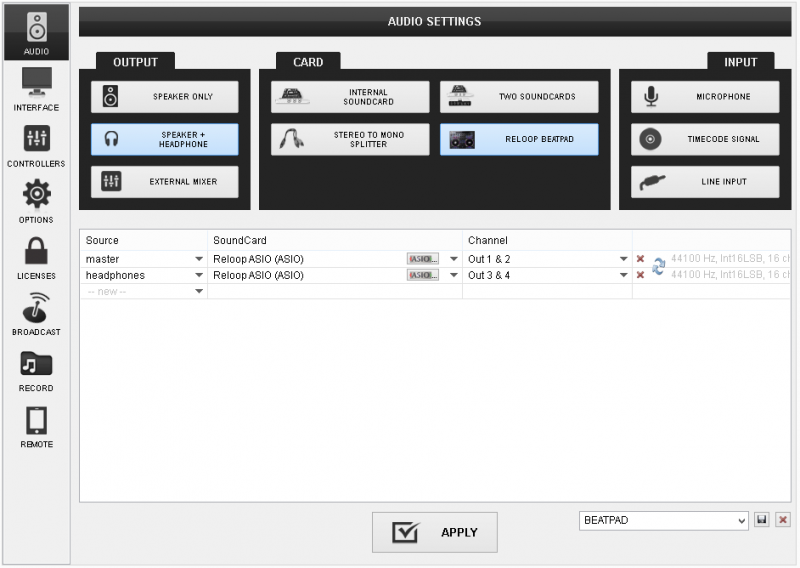
For further software settings please refer to the User Guides of VirtualDJ 8.
http://www.virtualdj.com/manuals/virtualdj8/index.html
LAYOUT
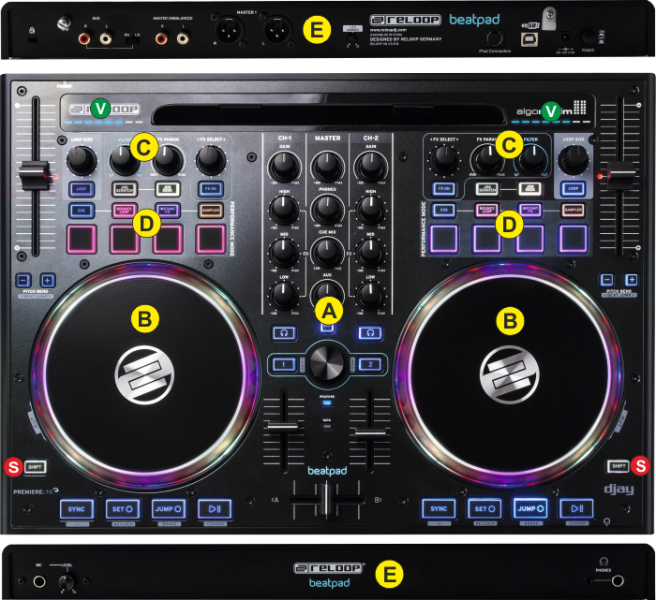
S. SHIFT. Press and hold this button to access secondary functions of other controls on the Beatpad. The SHIFT button can operate as a toggle or a momentary one depending on the SHIFT switcher ().
V. VU METERS. Indicate the Output Level of the Left and Right deck.
The functionality of each button and knob per section (as shown in the image below) will be explained in detail in the next chapters
A. Mixer & Browser
B. Deck Controls
C. Effects
D. Pads
E. Front & Rear
MIXER & BROWSER
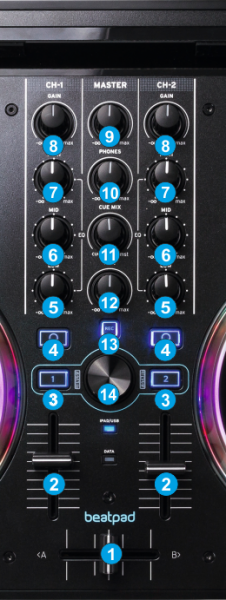
- CROSSFADER. Blends audio between left and right mixer channels.
- VOLUME. Adjust the Volume of each channel. If Fader Start is enabled (3) the deck will stop at the previously used Cue if the Volume Fader reaches the minimum position and will start playing if the Volume fader moves from the minimum position.
- LOAD. Press these buttons to load the selected track from the Browser to left or right deck. The LED of the button will be on if the deck is loaded.
Hold the same button for more than 2 seconds to unload the same deck.
Hold SHIFT down and then press one of these buttons to enable the Fader Start on a deck. The LED of the button will blink if Fader Start is enabled - PFL. Press these buttons to send each channel to the Headphones Output channel for pre-listening.
Hold SHIFT down and then use these buttons to define which deck is selected (A,B indicators at the 2 decks default GUI of VirtualDJ) - EQ LOW. Adjust the Low (Bass) frequencies for each mixer channel.
- EQ MID. Adjust the Mid frequencies for each mixer channel.
- EQ HIGH. Adjust the High (Treble) frequencies for each mixer channel.
- GAIN. Adjust the Gain of each mixer channel.
- MASTER VOLUME. Adjust the level of the Master Output. Hardware operation - movement not visible on the VirtualDJ GUI
- HEADPHONES MIXING. Adjust how the Channels and the Master Output blend at the Headphones Channel.
- HEADPHONES LEVEL. Adjust the Volume Output of the Headphones Channel. Hardware operation – movement not visible on the VirtualDJ GUI.
- AUX LEVEL. Adjust the Volume of the AUX Input. Hardware operation – movement not visible on the VirtualDJ GUI.
- REC. Use this button to record your mixing with VirtualDJ.
- BROWSE ENC. Scroll through files of folders. Push the encoder to set focus to the next available/visible Browser window (Folders, Songs List and Sideview).
Hold SHIFT down and then use the encoder to cycle through the available views of the Sideview (Automix, Sidelist, Karaoke, Sampler and Clones).
If focus is on the Folders list, hold SHIFT down and then push the encoder to open/close the subfolders. If focus is on the Songs List, hold SHIFT down and then push the encoder to add the selected track to the Automix List. If the focus is on the Automix List, hold SHIFT down and then push the encoder to start/stop the Automix.
DECK CONTROLS
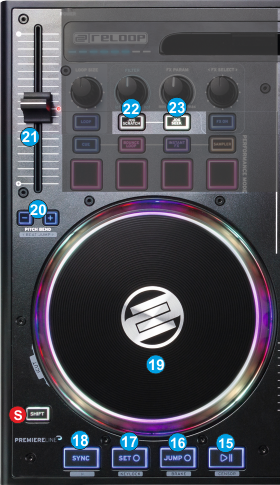
- PLAY/PAUSE. Plays / Pauses the track. Hold SHIFT down and then press this button to play the track in reverse. When released the track will continue to play from the position it would have been if the button was never pressed (censor)
- CUE JUMP. When the Deck is paused, you can set a temporary Cue Point by moving the Platter to place the Audio Pointer at the desired location and then pressing the Cue Button. During playback, you can press the Cue Button to return the track to this Cue Point and continue to play from that position.
If the Deck is paused, you can press and hold the Cue Button to play the track from the Temporary Cue Point. Releasing the Cue Button will return the track to the temporary Cue Point and pause it.
To continue playback without returning to the Temporary Cue Point, press and hold the Cue Button, then press and hold the Play Button (15) and then release both buttons.
Hold SHIFT down and then press this button to stop the track with a gradual brake effect. - SET CUE. This button has the same functionality as the JUMP CUE (16) with the difference that the deck will stop to the Cue point if the deck is playing.
Hold SHIFT down and then press this button to enable/disable Master Tempo (Key-lock) - SYNC. Press this button to automatically match the corresponding Deck's tempo with the opposite Deck's tempo and phase.
Hold SHIFT down and then press this button to return and stop the deck at the beginning of the track. - JOGWHEEL. Touch sensitive platter for scratching (SCRATCH mode), bending (CD Mode) or Seek mode. In Scratch mode, use the jogwheel to scratch and the outer ring to bend. If the JOG SEEK mode is enabled use the jogwheel to navigate through the track (seek mode)
The jogwheel offers multi-color leds, which will show the playing marker, the song progress bar (in SEEK mode), and other colored combinations depending on the applied effect, loop, loop roll or Filter. - PITCH BEND Use these buttons temporary slow-down/speed up the tempo of the track. Once the buttons are released the track will continue to play at the tempo designated by the pitch fader.
Hold SHIFT down and then use these buttons to jump 1 beat backwards or forward (Beat Jump) - PITCH. Controls the track's playback tempo. The red led indicates that the pitch fader of the unit is on zero (center) position
- JOG SCRATCH. Use this button to toggle between the Scratch (Vinyl) and Bend (CD) Jogwheel mode.
- JOG SEEK. Use this button to set the Jogwheel to SEEK mode. If the Seek mode is enabled, use the jogwheel to fast seek through the track.
EFFECTS & LOOPS
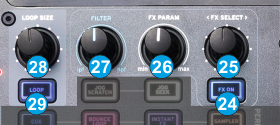
- FX ON. Use this button to enable/disable the selected effect.
Hold SHIFT down and then use the left FXON button to trigger the selected Video Transition and the right FXON button to trigger the selected Master Video Effect. - FX SELECT. Use this encoder to select an Effect for this deck. Push the encoder to open/close the GUI of the selected effect.
Hold SHIFT down and then use the left FX SELECT encoder to select a Video Transition and the right FX SELECT encoder to select a Master Video Effect.
Hold SHIFT down and then push the left encoder to open/close the GUI of the selected Video Transition and the right encoder to open/close the GUI of the selected Master Video Effect. - FX PARAM. Use this knob to control the 1st parameter of the selected effect. Hold SHIFT down and use this knob to control the 2nd parameter of the selected effect.
- FILTER. Use this knob to apply a Low Pass/High Pass Filter to the deck. In middle position no Filter is applied.
Hold SHIFT down and use this knob to adjust the key of the track. In middle position the track will have its original value. - LOOP SIZE. Turn the encoder anti-clockwise to half the size of the loop and clockwise to double it. Hold SHIFT down and then use the encoder to move the triggered loop forward or backwards by 1 beat.
Push the encoder to trigger the selected size loop. Hold SHIFT down and then push the encoder to toggle between normal and Roll Loop mode. - LOOP. Press this button to trigger a loop of the selected size (toggle function).
When Roll loop mode is selected, the button will apply a temporary (while pressed) Loop Roll and the track will return to the position it would have been if the Loop was never triggered.
PADS
The 4 Performance Pads (31) offer 4 different modes, depending on the PAD MODE buttons (30).
HotCues mode
Each one of the 4 pads assigns a Hot Cue Point (1 to 4) or returns the track to that Hot Cue Point.
When a Hot Cue Button is unlit, you can assign a Hot Cue Point by pressing it at the desired point in your track. Once it is assigned, the Hot Cue Button will light up blue.
Hold SHIFT and then press a pad to delete its assigned Hot Cue Point.
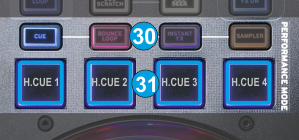
Bounce Loop (Roll) mode
Press (and keep down) any of the 4 pads to trigger a momentary Loop Roll of a different size (in beats) as per the image.
Once the PAD is released the track will continue to play from the position it would have been if the Loop Roll was never triggered.
The size of the applied Loop Roll can be adjusted with the LOOP SIZE (28) encoder as well.
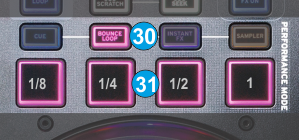
Instant FX mode
Press (and keep down) any of the 4 pads to apply a momentary Effect (Beat Grid, Flanger, Reverb or Backspin) as per the image.
The parameters of these effects can be adjusted from the FX PARAM knob (26).
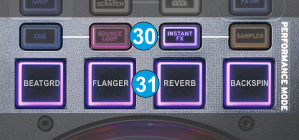
Sampler mode
Press the SAMPLER mode button to set the PADs to Sampler mode.
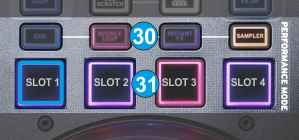
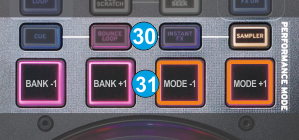
Each one of the pads triggers a sample from the selected Sampler Bank of VirtualDJ. If a bank has less than 5 samples, both sides of the Beatpad will control the same samples. If a bank has more than 4 samples, the left side of the Beatpad will control samples 1 to 4 and the right side samples 5 to 8.
The LEDs of the Pads will tend to get the assigned color of each sample, however the colors may not match perfectly due to the limited offered colors of the Pads.
Press the pads to trigger a sample. Depending on the selected trigger mode, use SHIFT and the same pads to stop the sample.
If the SAMPLER mode is selected, press and hold down the same Mode button to receive the Sampler parameters.
Use Pads 1 and 2 to select the previous and next available Sampler Bank.
Use Pads 3 and 4 to select the next sampler trigger mode (On/off, Hold, Stutter and Unmute)
FRONT & REAR PANELS

- MIC INPUT. Connect a 1/4" microphone to this input. This input's audio signal is routed directly to the Program Mix and Cue Mix.
- MIC LEVEL. Adjust the gain of the microphone input channel.
- HEADPHONES SOCKET. Connect your 1/4" headphones to this output for cueing and mix monitoring.

Reloop Beatpad - Rear Panel - AUX INPUT. Connect your audio sources to this RCA input. The input can accept both line and phono-level signals, depending on the switcher next to the Input.
- MASTER OUTPUT (RCA): Use standard RCA cables to connect this output to a speaker or amplifier system. The level of this output is controlled by the Master knob on the top panel.
- MASTER OUTPUT (XLR): Connect this low-impedance XLR output to a PA system or powered monitors. The level of this output is controlled with the Master knob on the top panel.
- SHIFT LOCK: Define if the SHIFT buttons (S) will operate as toggle or momentary (while pressed).
- LED DIMMER: Adjust the brightness of the Leds when those are at the OFF position (dimmed).
- USB. This USB connection sends and receives audio and control information from a connected computer.
- POWER: Use the included power cable to connect the Beatpad to a power outlet. While the power is switched off, plug the cable into the Beatpad first, and then plug the cable into a power outlet. Use the Power Switch to turn the NS7II on and off. Turn on NS7II after all input devices have been connected and before you turn on amplifiers. Turn off amplifiers before you turn off NS7II.
- POWER BUTTON. Use the Power Switch to turn the Beatpad on and off. Turn on Beatpad after all input devices have been connected and before you turn on amplifiers. Turn off amplifiers before you turn off Beatpad.
RECORDING
The Beatpad offers 2 Inputs, an AUX at the rear side and a Microphone Input at the front. However none of these Inputs can be routed to the software mixer and recorded (or broadcasted).
The input signal of both Inputs is directly routed to the Master Output of the Beatpad (Hardware inputs).
